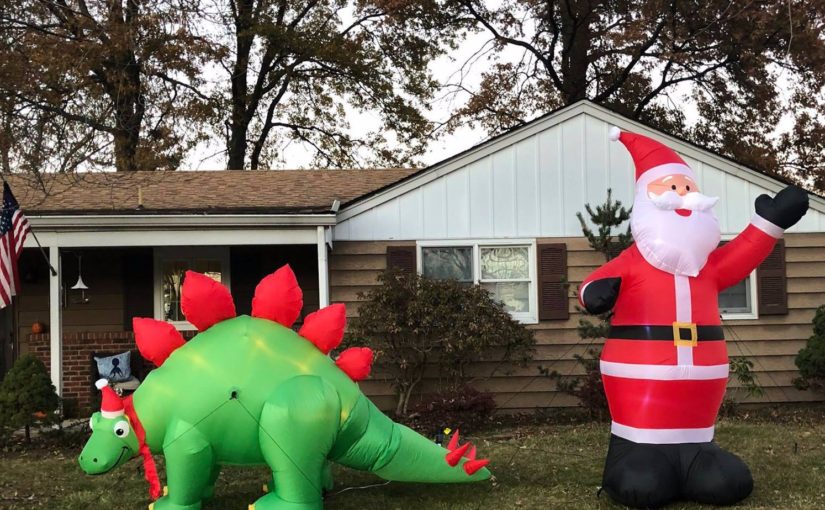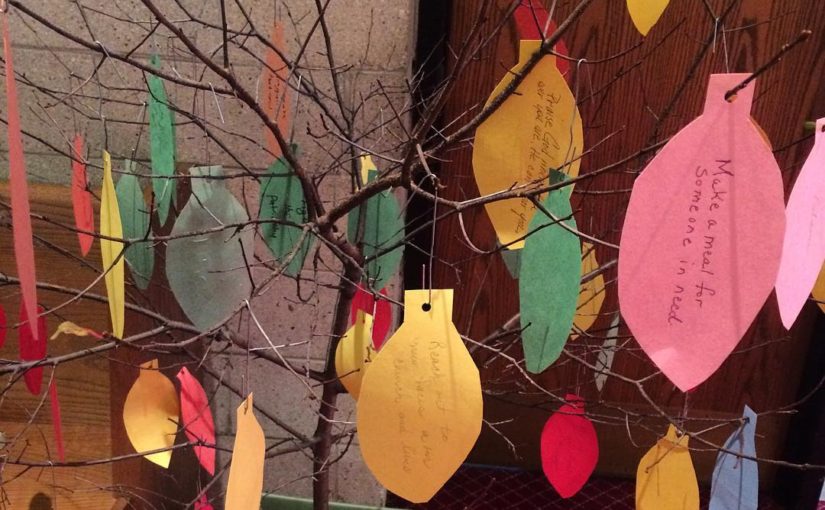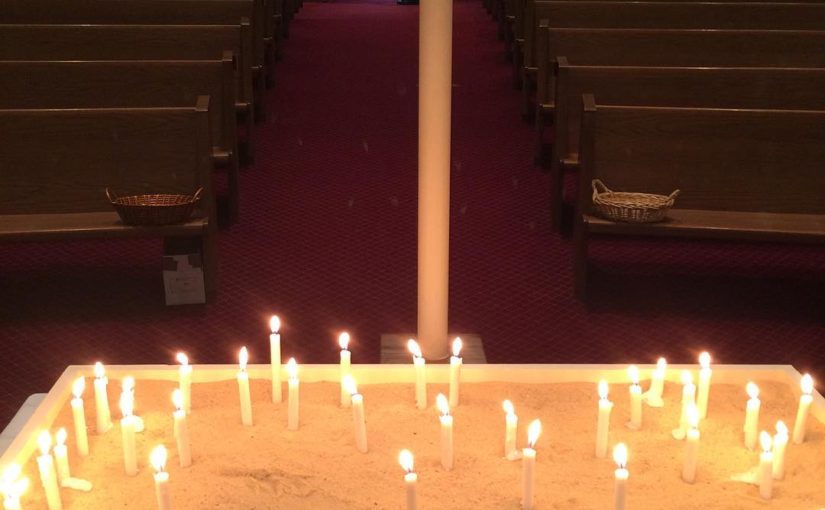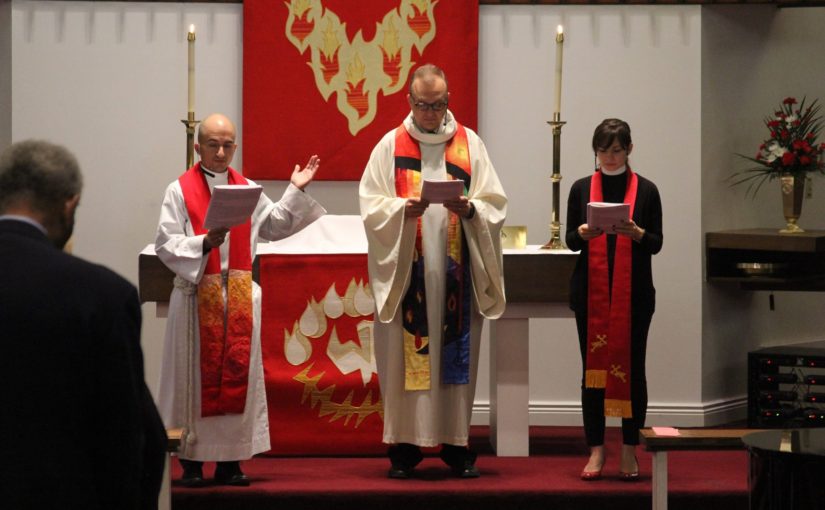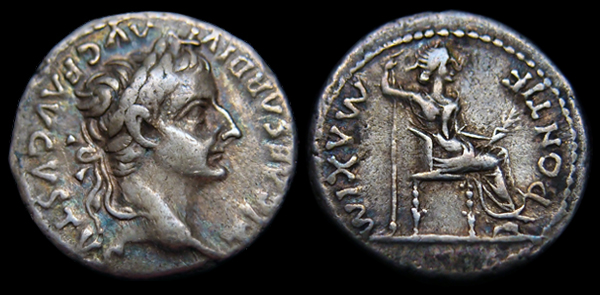The beginning of the good news of Jesus Christ, the Son of God.
As it is written in the prophet Isaiah,
“See, I am sending my messenger ahead of you,
who will prepare your way;
the voice of one crying out in the wilderness:
‘Prepare the way of the Lord,
make his paths straight,’”
John the baptizer appeared in the wilderness, proclaiming a baptism of repentance for the forgiveness of sins. And people from the whole Judean countryside and all the people of Jerusalem were going out to him, and were baptized by him in the river Jordan, confessing their sins. Now John was clothed with camel’s hair, with a leather belt around his waist, and he ate locusts and wild honey. He proclaimed, “The one who is more powerful than I is coming after me; I am not worthy to stoop down and untie the thong of his sandals. I have baptized you with water; but he will baptize you with the Holy Spirit.”Mark 1:1-8
My sermon from Second Sunday of Advent (December 10, 2017) on Mark 1:1-8. Listen to the recording at the bottom of the page or read my manuscript below.
****************************
If you are giving out Christmas gifts this year, who on your list is the hardest person to shop for? For me, it’s my parents. They are terrible to shop for. They are one of the few people I know who, when you ask them what they want, will say “nothing” – and they mean it. They buy what they want when they want it; they like to plan and pay for their own adventures; and they are content with what they have. It’s so annoying. So over the last few years, I’ve resorted to sending them a photo book full of pictures of their grandkids. I go through all the pictures I took over the last year, relive all those memories we created, and put an entire year into book form. It’s sort of a fun thing to create. But making this kind of book is also a little terrifying because I want it to be perfect. I have this subconscious desire to give my parents a photo book that’s full of beautiful pictures. I want them to open the book up and instantly know what we were doing without me having to explain it. And if I’m honest, I also want to – sort of – show off just a tiny little bit. I want to humblebrag and overtly brag about just how fun, awesome, and well-adjusted my family is. And this is an odd thing to do because my parents know just how imperfect we are. They’re not asking me to brag or measure up but I feel like I need to anyways. There’s probably some kind of family dynamic at work here that I should unpack with a therapist at some point but there’s another issue here too. There’s something about this season, about these four weeks before Christmas when all of us, I think, try to chase after a picture perfect kind of Christmas. And even if we don’t think we do, the image of what a perfect Christmas looks like is all around us. Stores, tv ads, and every show on HGTV flashes hints about just how postcard perfect your holiday could be. I wonder if, even subconsciously, being around so much perfect ends up changing what we do. We start needing our Christmas tree and out decorations to be just right. We need to find that perfect present for everyone on our list. And we do all we can to look impeccable and festive at every holiday party we attend. We are in a season where being perfect isn’t only for kids trying to use their good behavior to convince Santa to bring them the toy they really really want. It’s also a season when all of us chase after perfection: the perfect home, the perfect meal, the perfect relationship, and a perfect, peaceful, and loving family. The weeks before Christmas is when we try to make an ideal a reality. That’s why I want my photo book for my parents to be all kinds of awesome. And why I want the last photo in that book to be a perfect family portrait with everyone, including the 3 year old, looking straight at the camera.
But you know what? That perfect picture has yet to come. And it’s sort of amazing how many different ways that picture fails to actually work out. The Christmas ideal, this picture or expectation we carry with us – rarely ever shows up – because we live in the real world. There’s never a holiday where there isn’t stress, or worry, or disagreement, or conflict. And even when the stars align and we are blessed to have a moment that meets our incredible expectations, that moment doesn’t last. The imperfect always comes back. And even though I think most of us know, deep down, that this season will not be perfect, we still get caught up chasing after our ideal. And that chase causes us to act as if this season, somehow, depends fully on us. If the tree lights go out or a turkey gets burned or if a heated conversation leads to conflict and anger around our dining room table – the more we chase after the ideal, the more we make Christmas depend on what do, what we say, and what we can afford. We make Christmas, in the end, depend on us. And a Christmas that depends on us, doesn’t really sound like Christmas at all.
Now, the next four weeks will not be as perfect as we want them to be. Our homes will not look like they belong on HGTV nor will every Christmas light on our pre-lit tree actually last all month long. And not everyone in our family will be looking at the camera. But that’s okay. Because this season, this Advent, this waiting for Christmas – isn’t a season that depends on us. It’s a season about a God who showed up, stuck around, and will come back soon even though we, as people, rarely live and love and serve the world as the ideal Christians God calls us to be.
Jesus, in this passage from Mark, makes a promise to us and to the entire world. He tells us to keep awake because we do not know when the master of the house will come; they might come in the evening, or at midnight, or at the cockcrow, or at dawn. Jesus, in these verses, seems to tell his friends to be ready for the moment when God will shake every mountain. But I think Jesus is really telling them to keep their eyes open because God is about to do something that doesn’t appear ideal. Jesus, in the chapters right after this passage, takes his first steps towards the Cross: a journey starts with a meal, in the evening, with his friends. And after this last supper, Jesus is betrayed and, in a moment of anguish and prayer, he finds his disciples asleep because it was the middle of the night. Jesus is then arrested and his trial begins. We listen and watch his disciple Peter deny him as the cock crows. And then, in the morning, Jesus is brought before the Roman Governor Pontius Pilate who then condemns him to death. In the words of David Lose, “the heavens shake and the sun is darkened … [at] precisely … the moment when [Jesus] is nailed to the cross and our breath is taken away as we see God’s love poured out for us and all the world.” We are not in a season asking us to reach some ideal. Rather, we are with a God who, regardless of the season, comes to us as we are because the imperfect, the vulnerable, the sick, lonely, poor, and hungry are worth a love that does not end. Will we still try to chase our ideal Christmas this year? Yes. But does that mean that Jesus will only show up if we get Christmas right? Not at all. Because the picture perfect love that God gives the world is a love that shows up in the form of a fussy and vulnerable little baby and is made real by a savior who, with arms outstretched, shows us what a picture perfect kind of love actually looks like.
Amen.
Podcast: Play in new window | Download


